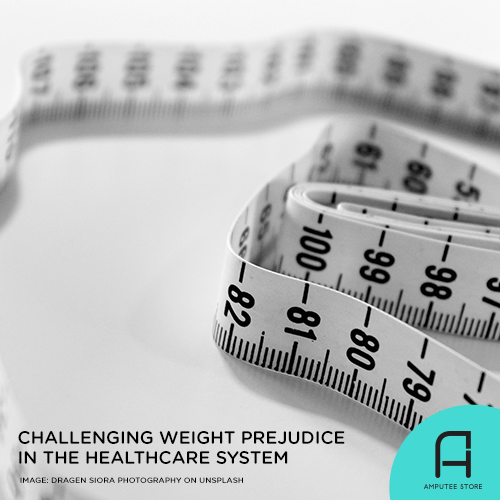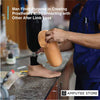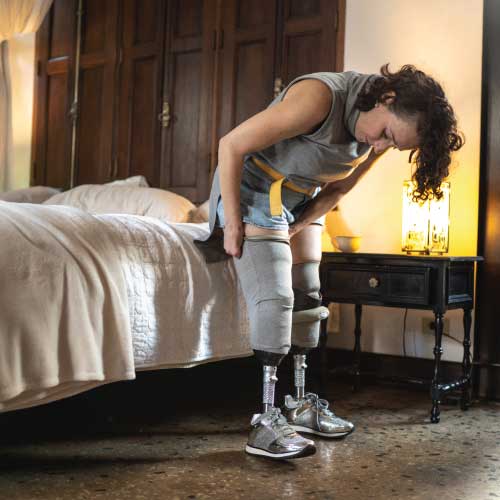Challenging Weight Prejudice in the Healthcare System
Patients with obesity often face weight bias in healthcare settings, where healthcare professionals judge and stigmatize them. To push back against weight bias, advocates in the US have introduced the first-ever Obesity Bill of Rights.

The bill, published on January 31, 2024, by the National Consumers League and National Council on Aging, has the support of 40 national obesity and chronic disease organizations as well as several lawmakers.
The Obesity Bill of Rights comprises eight principles. These include the right to respect; the right to treatment from qualified health providers; the right to make treatment decisions; the right to accurate, clear, trusted, and accessible information; the right to accessible obesity treatment from health systems; the right for older adults to receive quality obesity care the right to person-centered care; and the right to coverage for treatment.
Impact of weight bias on patient and amputee care
Weight bias in healthcare has serious repercussions. It can often discourage people from seeking and receiving proper medical attention. Physicians and medical providers who harbor weight bias tend to spend less time and engage in less discussion with patients who have obesity compared to patients with lower body mass index. Biased providers are also often hesitant to perform preventative health screenings, further exacerbating the issue.
This problem is also evident among patients with limb loss, where weight bias has led to inadequate diagnosis or treatment. Some individuals with limb loss or limb difference believe they were assigned a lower K-level due to weight bias. Others feel that they did not receive a suitable prosthetic device to enable them to return to their daily activities because of their weight.
The impact of weight bias is far-reaching, and it is essential to address this issue to ensure everyone has access to the best possible healthcare.
With the introduction of the Obesity Bill of Rights, advocates hope that workplace policies and state and federal laws will change to address weight bias in healthcare and ensure that patients with obesity receive quality care and respect from healthcare professionals.
Why do healthcare providers have weight bias?
Healthcare providers, whether doctors, nurses, physical therapists, dietitians, psychologists, or prosthetists, are all capable of expressing weight bias. According to an article in Pediatrics, healthcare providers with weight bias may harbor negative assumptions about people with excess weight or obesity, including categorizing these patients as lacking self-control and lazy.
Traditional medical education seems to perpetuate weight bias. Typically, obesity is presented as the result of unhealthy lifestyle choices, which oversimplifies the complexity of the condition. As a result, doctors may jump to the conclusion that a patient’s weight problem is due to excessive eating and lack of exercise. With this type of education, medical students and practitioners are not provided with enough training and tools to address the multifaceted components of obesity, including genetic and environmental factors.
Another potential cause of weight bias in healthcare is the belief that shame motivates people to lose weight. However, research suggests that shame, stigma, and prejudice are more likely to have negative consequences, such as causing patients to avoid medical appointments and reducing their physical activity levels. The World Obesity Federation found that patients who experienced weight stigma gained more weight instead of losing it.
This emphasizes the need for a more comprehensive and compassionate approach to addressing obesity in healthcare.
Advocate for yourself
If you feel like your healthcare provider is treating you unfairly because of your size, it’s okay to speak up for yourself. You don’t have to suffer in silence or feel ashamed. Instead, you can use this as an opportunity to educate your provider and advocate for better treatment.
One way to start a conversation is by bringing in an article that explains weight bias and how it can affect patient care. You can use this to help your provider understand where you’re coming from and how they can improve their approach.
Another strategy is to use helpful phrases, like:
“I’ve read that people with larger bodies often don’t receive the same level of care as other patients. I want to make sure that I’m being heard and that my concerns are being taken seriously.”
“I’ve heard of amputees with larger body sizes not getting the appropriate prosthetic device for their true activity level. I want to ensure I’m getting the right prosthesis so I can return to doing the things I used to enjoy pre-amputation.”
If your current healthcare provider doesn’t improve, consider finding a new provider, particularly if your experience makes you feel uncomfortable or unsafe.











































































